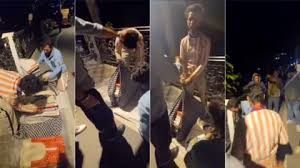Tensions between Pakistan and India have once again spiked along the Line of Control (LoC). But for Kashmiris living in India, the aftermath of the deadly Pahalgam attack has become far more personal—and dangerous.
Across India, incidents of Kashmiri harassment are spreading rapidly. The recent attack in Pahalgam, which killed 26 tourists, has triggered a wave of abuse against ordinary Kashmiris.
Shabir Ahmad Dar, a pashmina shawl seller from Indian Illegally Occupied Jammu and Kashmir (IIOJK), has been living and working in Mussoorie for 20 years. Last week, he was publicly beaten by members of a Hindu right-wing group. A video now viral on social media shows Dar and another Kashmiri being assaulted and cursed. The attackers trashed their stall while shouting accusations about the Pahalgam incident.
“They told us we were responsible. They ordered us to leave town,” Shabir said. His shawls, worth thousands of dollars, are still at the stall. “We’re too scared to go back,” he added.
Police arrested three attackers after public outrage. But they were released soon after, simply by paying a fine and apologizing. This leniency has deepened the fear and sense of injustice among the local Kashmiri traders.
Shabir is not alone. Dozens of other Kashmiri vendors, who had built their lives in Mussoorie, have fled the town. They say they no longer feel safe.
Kashmiri harassment is not limited to Mussoorie. Reports from cities across India reveal a disturbing pattern of threats, hate speech, and intimidation. The BBC has documented more than a dozen such cases. Students and vendors alike are facing mistreatment—not only from mobs but sometimes from neighbors and classmates.
Videos online show young Kashmiris being beaten and driven out of university campuses. Some are assaulted on the streets with no one intervening.
One of the survivors of the Pahalgam attack, the widow of a naval officer, has pleaded with the public. “Please don’t target Muslims and Kashmiris,” she said. “We only want peace.”
But the attacks continue. Many Kashmiris have returned to IIOJK, fearing for their safety.
Ummat Shabir, a nursing student in Punjab, was called a “terrorist” by women in her neighborhood. Her classmate was forced out of a taxi by the driver who found out she was Kashmiri. “It took us three days to reach home. But we had no choice,” she said.
Yet even their homeland doesn’t feel safe. Following the attack, Indian security forces launched a large-scale crackdown in IIOJK. Thousands have been detained. More than 50 tourist spots are now closed. Extra troops have been deployed, and homes of families linked to suspected militants have been demolished.
Locals call this targeting a form of collective punishment.
IIOJK Chief Minister Omar Abdullah acknowledged the need to punish the guilty. But he warned that innocent people should not suffer. Former CM Mehbooba Mufti condemned the demolitions too. She demanded the government draw a line between terrorists and ordinary citizens.
A Kashmiri student, speaking anonymously, said, “We always pay the price when tensions rise. And yet we are always treated with suspicion.”
Shafi Subhan, another veteran shawl seller from Kupwara, said this abuse is worse than anything he’s seen. Even after the 2019 Pulwama attack, he never felt so publicly threatened.
Mussoorie once felt like home, he said. “Our customers were kind and joyful. They loved our work.” But no one stepped in when the attackers came. “People just watched. That hurt more than the beating.”
The fragile peace in Kashmir is under pressure again. The Indian government highlights roads, hotels, and investments to show progress since removing the region’s special status in 2019. But many say civil rights and political freedoms have been crushed.
Anuradha Bhasin, editor of Kashmir Times, said the suspicion never leaves the locals—even as militancy has gone down over the years. “They’re always made to prove they’re innocent,” she said.
After the Pahalgam attack, Kashmiris protested peacefully. Shops remained shut. Newspapers printed black front pages. Omar Abdullah offered a public apology for failing to protect visitors.
Bhasin said Kashmiris have never supported such killings. “They’ve lost enough of their own. They understand the pain.” But she warned that more violence and intimidation will only push Kashmiris further into fear and isolation.


